Broadwater Farm
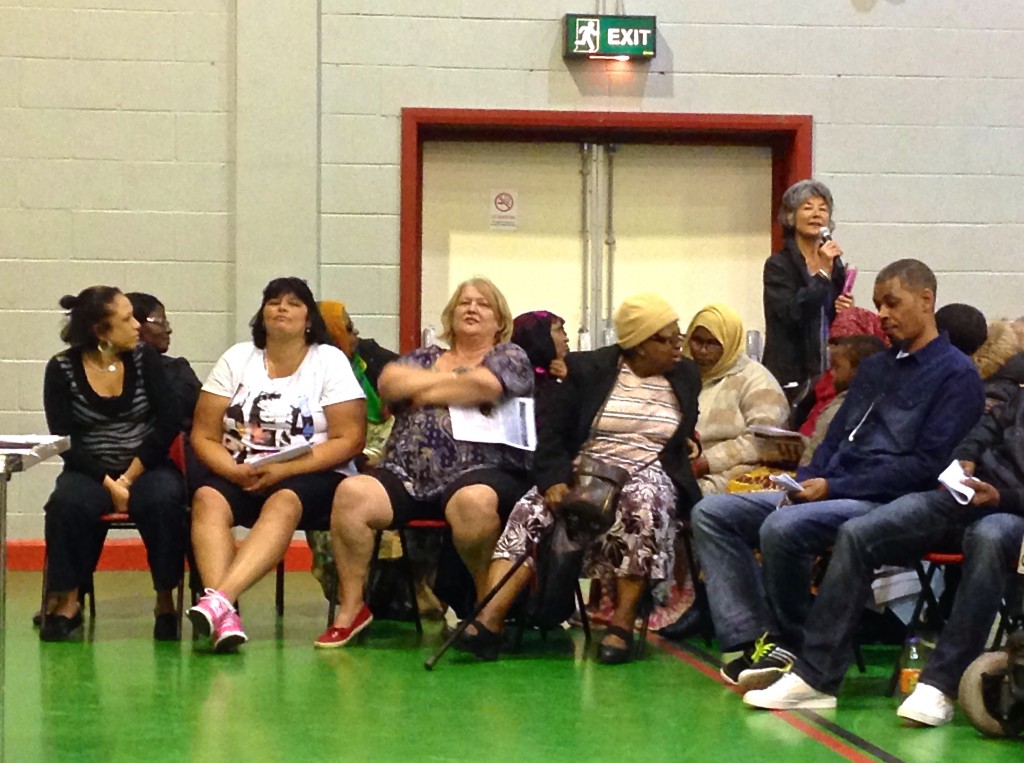
*
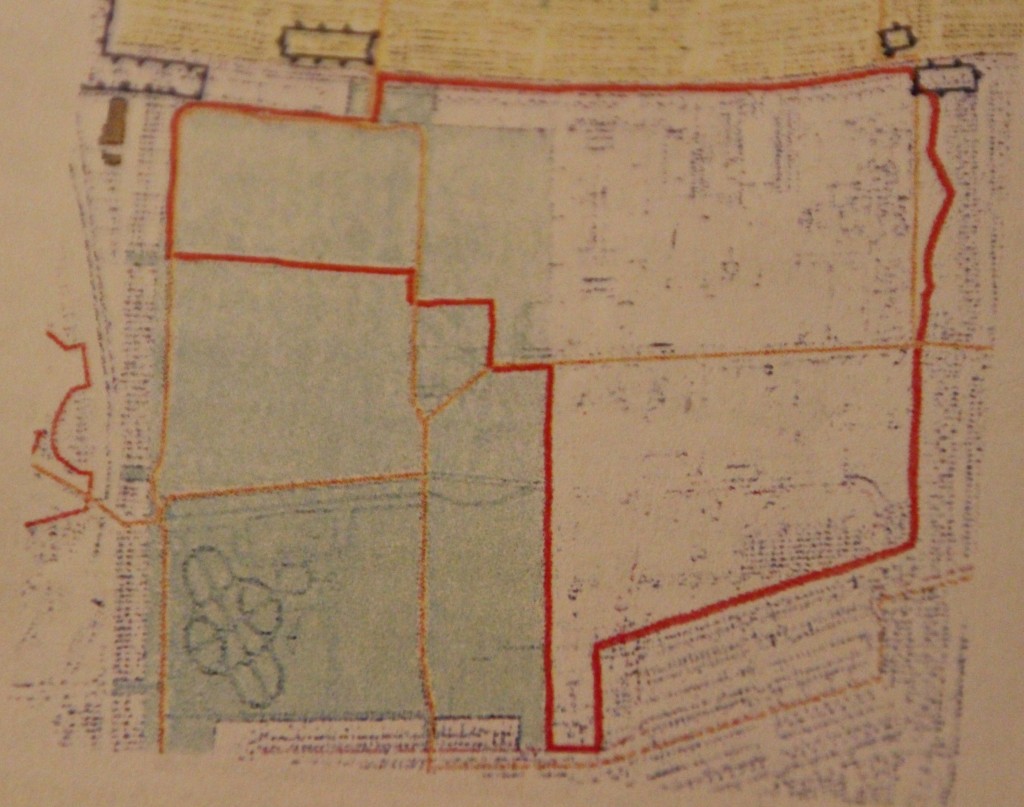
*
Planners draw a red line around Broadwater Farm. What does this mean for the estate’s residents?
*
By Paul Coleman
*
A planning officer draws a red line on a map.
The red line troubles some 250 people.
So troubled, that they gather in a north London community centre to talk about this red line for the bulk of their midweek spring evening (23 April).
In the United States, redlining is an infamous discriminatory practice. Banks and insurance companies refuse loans, mortgages and cover to people living within poorer redlined areas.
In 21st Century London, property developers, councillors and planners redline housing estates they want demolished and redeveloped with new luxury private homes. Lower income residents are decanted or dispossessed, and displaced.
They are replaced by affluent – and often very wealthy – private market buyers, renters and overseas investors. Developers and councils seductively robe these outcomes as ‘regeneration’.
*
Broadwater Farm
Haringey Council planners designate this redlined Tottenham neighbourhood as Site Allocation 63 in its draft Local Plan for Haringey 2011-2026 – a plan listing potential development and ‘regeneration’ sites across the entire borough. The Council says the plan still requires full approval from councillors and is ‘currently an emerging draft document’. Haringey Council says it needs to meet ‘a target of nearly 20,000 modern, high-quality new homes built by 2026, with a focus on regeneration areas in Tottenham and Wood Green’.
On the map SA 63 includes the Broadwater Farm council estate and the adjacent Lordship Recreation Area, a large and locally popular public park. The red line also encloses privately owned homes – and homes rented from housing associations – on Somerset Close, Lido Square, Moira Close and the south side of Lordship Lane.
People on average and lower incomes fear SA63 means their homes could be demolished. Children could lose their playing fields. Families could be displaced to other parts of the borough. And, a once scarred yet now healed community could be broken up.
*
Challenged
Julian Secker, who lives in the Tangmere block at Broadwater Farm, and is a committee member of the Broadwater Farm Residents Association, says council documents “clearly show that Haringey Council is clearly considering large-scale demolition and rebuilding but there are no definite plans yet”.
Secker tells residents at the meeting to look at a list of Council sources that show Haringey’s ambitions. They include a reference to Steve Kelly, a Haringey Council planning officer, who ‘when challenged at a February meeting on Broadwater Farm, admitted that Lordship Rec would be needed for housing for people displaced by any demolitions on Broadwater Farm’.
“It’s not about improving flats under Decent Homes work,” warns Secker. “If Haringey’s Site Allocations plan is improved, in principle the whole of the Broadwater Farm estate could face demolition.”
Secker says Haringey will not replace the estate with the same amount of social housing that currently exists at Broadwater Farm. “Haringey’s own internal documents show this – and it means if you’re a council tenant, you probably won’t be rehoused on any development built on the site of this estate.”
Higher and high-density towers could replace the estate’s two 19-storey towers, low-rise blocks and surrounding houses. “It’d be private housing, shared ownership and affordable rental homes priced at around 65% of the local market rental average,” says Secker. “Most of us won’t come back to this area,” says Secker. “We’ll be moved to other estates.”
Secker recognises the veiled importance of Haringey Council’s “vague language”. The Council utters careful words such as ‘improvement and renewal’. “I’ve heard Haringey use this same language before when it consulted Love Lane and Northumberland Park estate residents,” says Secker.
Love Lane and Northumberland Park are council estates now threatened with demolition and redevelopment by the building of Tottenham Hotspur Football Club’s new stadium – the centre-fold standout project of Haringey’s developer-led plans to ‘regenerate’ Tottenham.
Secker accepts Broadwater Farm has maintenance and repair problems but Decent Homes work would sort these out. The government has provided £160 million to the Decent Homes programme to help local authorities repair council homes. But Haringey says it requires a ‘strategy for improving Haringey’s housing estates where simple refurbishment through the Decent Homes programme is not possible’.
*
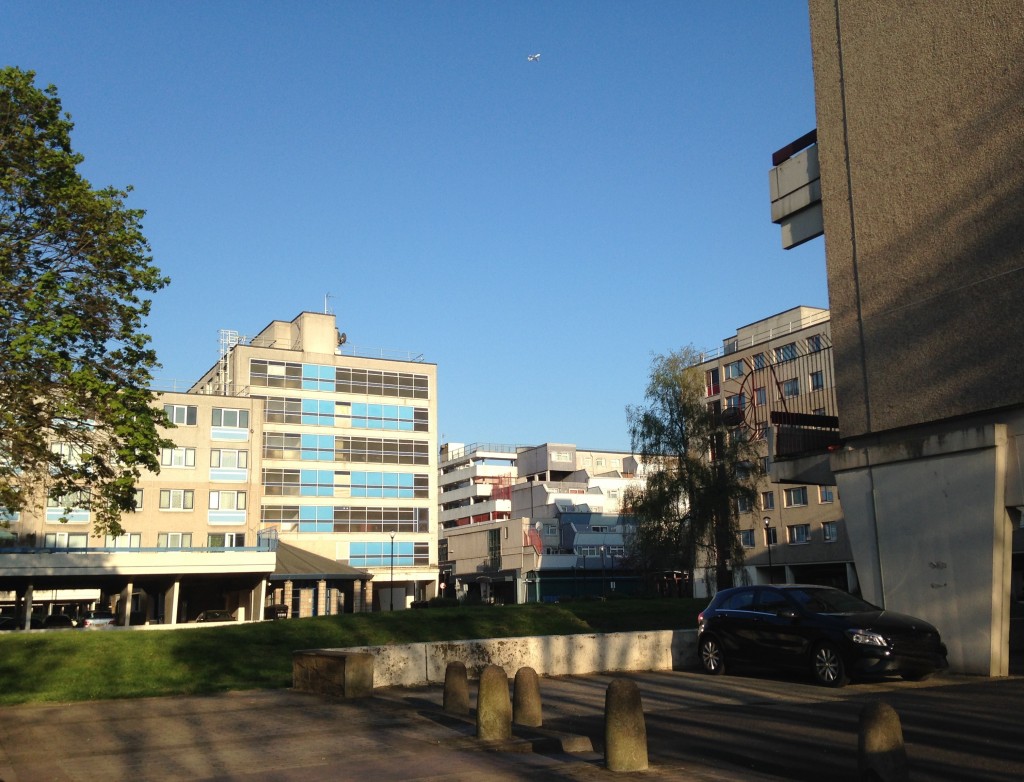
*
‘Verbal’
Residents and local activists believe they have a democratic right to know exactly why councillors and officers want to ‘red-line’, demolish and redevelop Broadwater Farm – and carve out a chunk of Lordship Rec for development too. But, by the start of May 2015, Haringey Council seems reluctant to reveal its thinking.
Helen Steel makes a Freedom of Information Request on 5 March asking to see ‘correspondence, emails, minutes, and any other documents relating to the inclusion of the areas shown on…SA63…and in particular the inclusion of Lordship Recreation Ground…’
Matthew Patterson, Haringey Council’s Head of Strategic Planning, on 7 April issues a classic response – in the sense of a classic perversion of local democratic principles. Patterson says: ‘The council does not hold any correspondence or minutes relating to the inclusion of the areas shown outlined on the map at SA63 Broadwater Farm…as the decision to include it was taken as part of a verbal discussion between council officers.’
Of course, Steel isn’t satisfied. On 7 April, Steel repeats her request, stating: ‘The planning department must have some record of how and when the proposal was first made and who was responsible for taking the decision to include it…’
On 12 April, Steel repeats her request again. Haringey acknowledges this request on 17 April and promises to let Steel ‘know the outcome of our investigation by 12 May’.
‘Can you please explain why you seek to delay your response until 12 May?’ asks Steel on 25 April. ‘That is longer than the 20 working days set for FOI responses. Given my request was first made on 5 March and you are now outside the time limit for providing information you should be expediting your response not dragging your heels.’
Back at the Broadwater Farm Community Centre, residents listen to Dave Morris, a seasoned Tottenham housing activist and member of the Haringey Federation of Residents Associations. “It’s only a proposal, at the moment,” says Morris, trying to emphasise the conditional status of Haringey’s ‘plan’. “But we want to knock it on the head straightaway and get it withdrawn.”
*
Guarantee
On 30 April, London Intelligence asks Haringey Council to identify ‘the officers who discussed and then decided to include the areas shown outlined on SA63 Broadwater Farm’.
London Intelligence also asks, ‘why are there no minutes or record of this important discussion and decision?’
Thirdly, ‘how is Haringey Council seeking to reassure Broadwater Farm residents that they won’t lose their homes – and similarly, Broadwater United’s young people that they won’t lose their football facilities?’
On 1 May, a Haringey Council spokesman replies: ‘While we’ve carried out some initial studies on proposals for Broadwater Farm, there are no firm plans for the estate, Lordship Rec or the surrounding area.
‘We know how much local people value the excellent work of Broadwater United and the football pitch, and we guarantee that any proposals would see the facilities retained or replaced.’
The spokesman adds: ‘There is no suggestion that any redevelopment will definitely happen and we’ll be speaking to residents this summer about what improvements they would like to see as part of our commitment that every family has a modern high-quality home.’
*
Covenant
The Broadwater Farm estate in Tottenham gained worldwide notoriety when PC Keith Blakelock was murdered during the violent 1985 riots that followed the death of local resident Cynthia Jarrett in a police raid. But over the past 30 years residents have transformed the quality of life on Broadwater Farm, working in partnership with a raft of Haringey councillors and officers. The estate might look similar architecturally to its early days but now functions very differently. It now boasts a health centre, children’s play areas, bus routes, concierges, and most recently, a state-of-the-art new school.
And, on a bright chilly April evening, supervised children clamber over good quality playground apparatus. Young lads receive football training on part of Lordship Rec.
Lordship Rec is protected from development by a covenant. Co-managed by Haringey Council and the community, Lordship Rec spans a large area adjacent to Broadwater Farm. Lordship Rec park users and the 1,300 members of Friends of Lordship Rec have also worked with local community groups and Haringey Council’s Parks Service to transform Tottenham’s largest public park. Residents and council officers secured £5 million from the Heritage Lottery Fund to build a new flower-lined channel for the River Moselle, a bike dirt track, an ‘environmental’ café and classroom, community gardens, refurbished theatre, and renovation of an enclosed sports pitch.
Lordship Rec and its sports facilities are also vital to Broadwater United. The club took over and transformed a derelict space. Twenty years on, United’s children’s and youth teams continue to play football and receive coaching.
*
Crazy
Clasford Stirling, Broadwater Farm’s popular youth and community worker, speaks to the residents. Many seem reassured by his presence in the hall.
Stirling says 300-400 young people use these facilities.
“One of them just asked me, ‘Are we going to lose our football pitch?’ “They don’t want to lose it,” says Stirling. “This estate is our home,” he adds.
“Haringey should’ve sat down and discussed this proposal with us first. It’s wrong to bully us with this proposal. I’ll be standing here with everyone fighting this. Our voice should be heard. We care about the children here. And care about this community.”
Stirling knows Haringey Council very well – and over the years has established good working relationships with many councillors and officers.
But now even Stirling seems mystified at Haringey’s ‘proposal’ to demolish and rebuild the estate, especially as people in the local community and at the council have invested so much time and resources to turn Broadwater Farm into a thriving community.
“It’s crazy,” says Stirling. “Thirty years ago, Broadwater Farm was branded as the worst estate in Europe,” adds Stirling. “Nobody wanted to come and live here.
“But the community stepped up and showed genuine hardworking people in the council that we wanted to change the estate but also the local area that we live in.
“I can see some good people in this hall – and we know people who have passed away – who’ve put in so much effort to improve Broadwater Farm estate, the park, and the local area.
“There’s still some problems we need to deal with. “But we’ve reached a stage in our lives where we’re happy.”
*
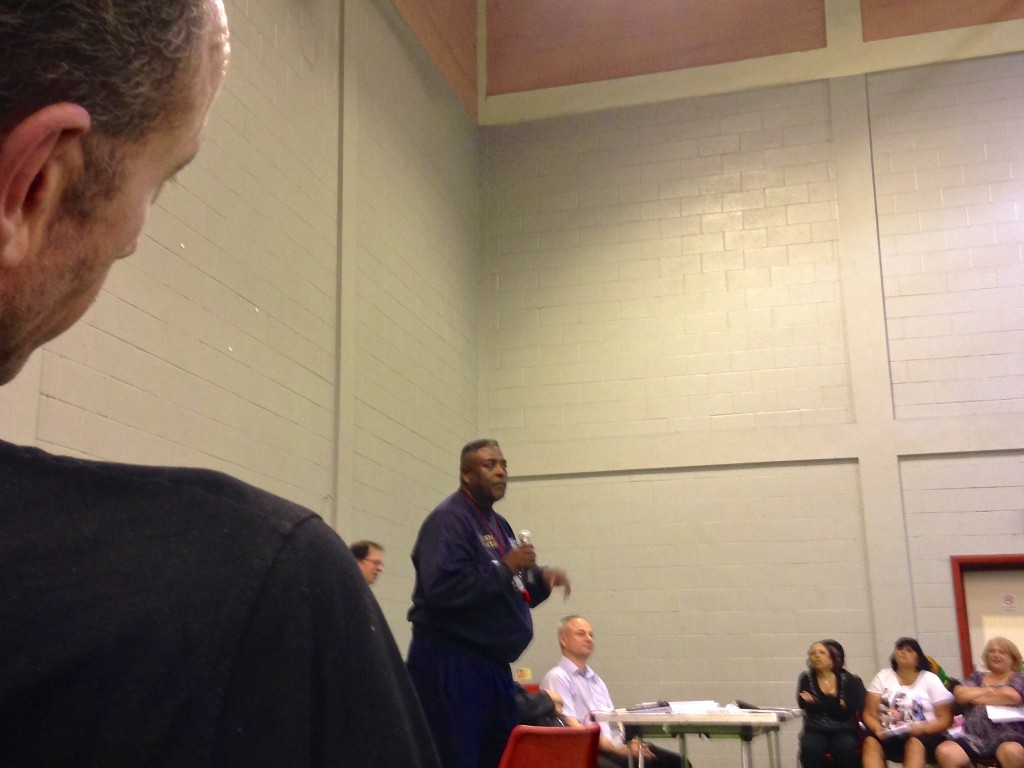
© London Intelligence 2015
*
Warning
The inclusion of Lordship Rec outwardly looks like many other developer-led and council-backed regeneration schemes coming out of the ground across London.
Acquire a piece of land. Build new homes. Decant residents from the existing estate into those homes. Demolish the estate.
However, another internal Haringey document from October 2014 shows the council’s own Parks and Leisure Department warning planning officers of legal complications should the Lordship Rec plan be advanced. ‘The proposals would seem to include the development of part of Lordship Rec which has recently been the recipient of a multi-million pound regeneration project,’ says a parks officer. ‘It is likely that any proposals to develop this land will result in a claim for the return of external funding for the project and face high levels of organised opposition.’
It’s a muted but prescient warning.
And, not just because of that £5m Lottery funding.
Opposition to the demolition of Broadwater Farm – and with it years of painstaking community work – is likely to be ‘high’ and ‘organised’.
As for Lordship Rec, Morris says: “We’re not against improvements but they must be led by, and be in the interests of the community.
“Not by property developers and pen pushers sitting in offices drawing up ridiculous plans.”
“There’s no way we’re going to let anyone interfere with one blade of grass on Lordship Rec without them first getting permission from the community.”
*
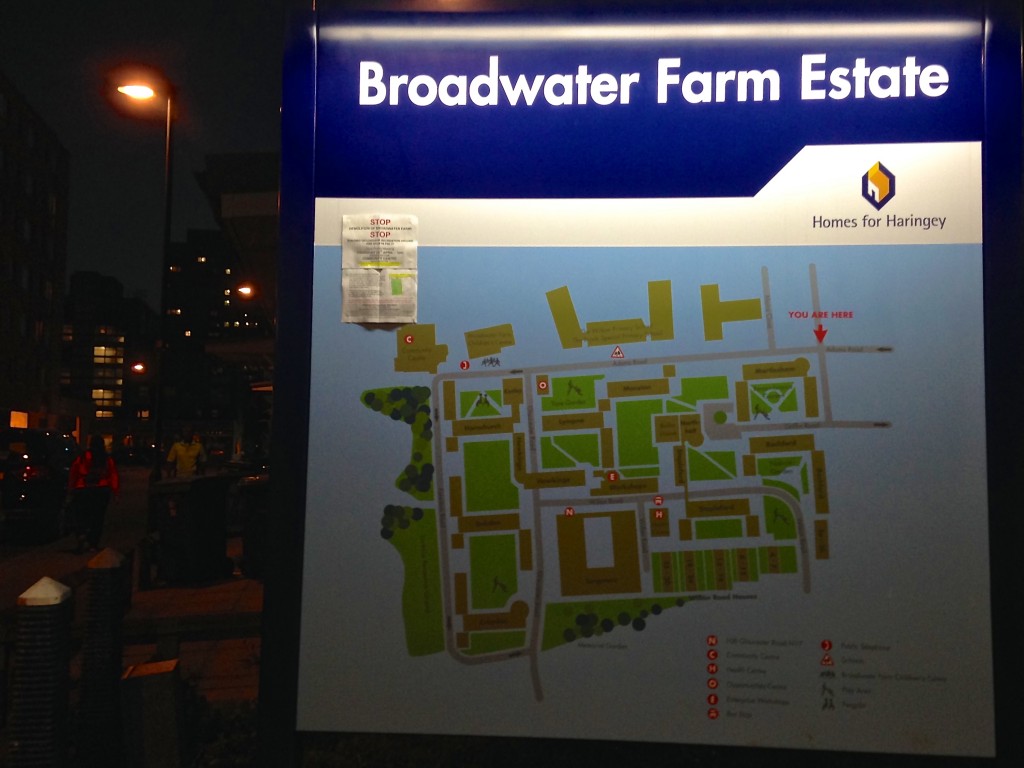
*
*
© Paul Coleman, London Intelligence 2015
